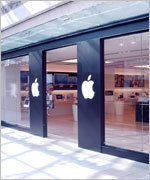The lovely bride and I were at the Apple Store at Lenox Mall recently, with our teenage son, and the place was (as usual) mobbed.
It’s clear this has been the Apple decade. Much as the 1980s belonged to Microsoft, and the 1990s to Web start-ups (Netscape, Yahoo, etc. etc. etc.). Apple defines the landscape. Which is interesting, given that Steve Jobs had, until this decade, been considered a rank failure next to the Great Mr. Gates.
Which goes to show you that there are times for strategies. Apple’s has always been a hyper-proprietary strategy. This was a weakness in the 20th century, because it kept Jobs from winning the computing market share his software deserved.
Today, however, nearly the entire value-add of hardware consists of software. The stars have aligned in Jobs’ direction. DRMs, Chinese mass production, the primacy of design, computing as consumer electronics. This is Apple’s time.
Which leads everyone asking, for how long, and how far can it go?
Quite a ways. I won’t comment on Apple’s stock, which has a P/E of near 40, but look at its potential top line growth. (I once owned Apple stock, in the 1990s, but sold out before it started its latest run-up in 2003.)
Even with everything working for it, the Macintosh platform still has a miniscule 3% market share.
Regardless of how people may worry about iPod saturation (and Apple has
turned these things into fashion, which does more to build obsolescence
than bad design ever could) PCs are where the money is.
Remember, Intel now makes Apple’s chips. Apple can ship as many Macs as
the market may desire. At prices ranging into the thousands of dollars.
I would argue, in fact, that Apple is now starting to take the desktop
market share Linux was long-expected to grab, despite its proprietary
nature. That’s again because Apple sees the PC as a consumer
electronics product, not as a computing product. The distribution
channels now agree with it.
It took Apple 20 years to achieve its position, and it will take other companies more than one year to whittle any of it away.
So in terms of top line and bottom line growth, it’s hard to see where Apple could possibly go wrong. Whether all this is really a good thing for computing in general is another matter. Personally I think it represents stagnation. But that’s just me.
Unless Steve Jobs gets sick. Watch for succession to become a big issue at Apple soon.













I don’t think your decades fit well with actual history. Apple was very strong on the desktop for more than half of the 80s. It was in the 90s that Microsoft really achieved their absolute dominance of the PC landscape. It is actually this decade that companies like AOL, Yahoo, and Google gained the valuations that let them stand toe-to-toe with with anyone in the world.
I don’t think your decades fit well with actual history. Apple was very strong on the desktop for more than half of the 80s. It was in the 90s that Microsoft really achieved their absolute dominance of the PC landscape. It is actually this decade that companies like AOL, Yahoo, and Google gained the valuations that let them stand toe-to-toe with with anyone in the world.
With a P/E ratio of almost 40, I think the price of Apple stock is seriously inflated and reflects some sort of bubble, rather than solid worth. If I held any, I’d sell.
Just my $0.02
With a P/E ratio of almost 40, I think the price of Apple stock is seriously inflated and reflects some sort of bubble, rather than solid worth. If I held any, I’d sell.
Just my $0.02
With a P/E ratio of almost 40, I think the price of Apple stock is seriously inflated and reflects some sort of bubble, rather than solid worth. If I held any, I’d sell.
With a P/E ratio of almost 40, I think the price of Apple stock is seriously inflated and reflects some sort of bubble, rather than solid worth. If I held any, I’d sell.